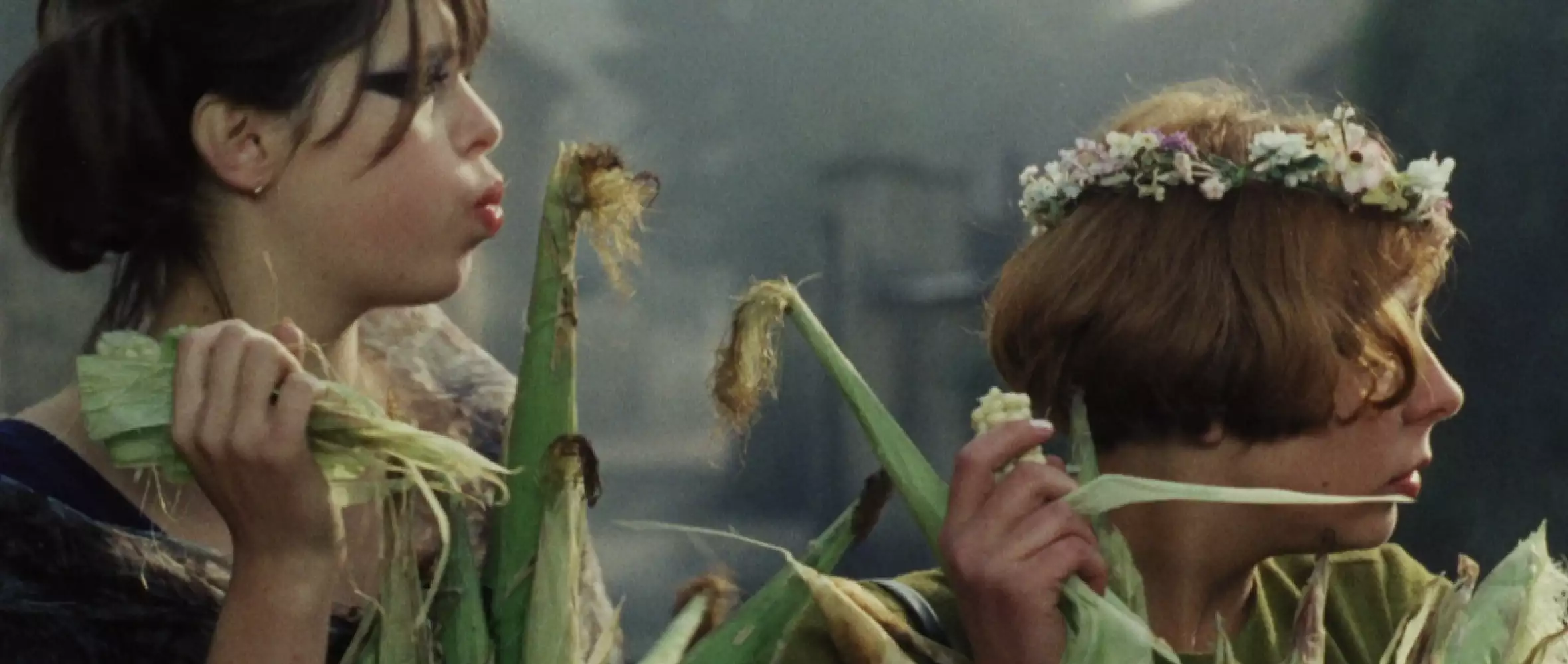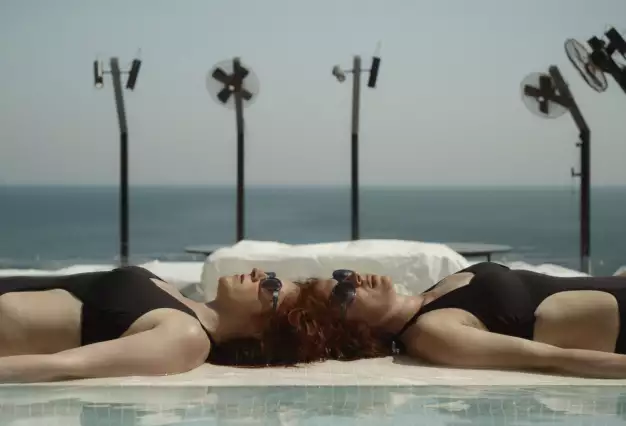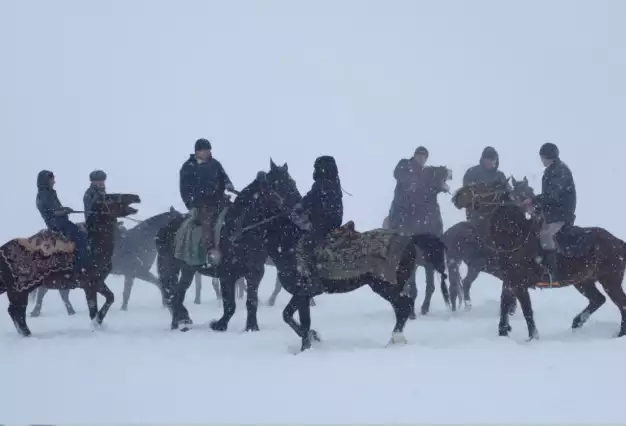
17 October 2017
Chytilová: Czech Film’s First Lady and Wild Child
Retrospective of Věra Chytilová at DocLisboa
Chytilová: Czech Film’s First Lady and Wild Child
Retrospective of Věra Chytilová at DocLisboa

Director Věra Chytilová, one of Czech cinematography’s best-known figures, passed away three years ago, leaving behind a great void. The director’s work, of which the experimental farce Daisies is particularly celebrated abroad, will be commemorated with an extensive retrospective at the DocLisboa festival (October 19-29), where some three dozen of her shorts, documentaries, and feature films will be screened.
Article by Hedvika Petrželková for Czech Film Magazine / Fall 2017
“For me personally, Chytilová is above all a mysterious director whose work remains to be fully deciphered or even seen: an elusive and indefinable auteur. Her enduring legacy, comprising almost 20 features, follows an ever-changing stylistic trajectory,” says Boris Nelepo, film critic and programmer of the Chytilová retrospective at DocLisboa.
The retrospective is organized by the festival in curatorial and financial partnership with the Czech Film Center. The full program of DocLisboa’s retrospective is available here:
http://www.doclisboa.org/2017/en/seccoes/vera-chytilova-retrospective/
In recent years the festival has featured the work of such illustrious and groundbreaking directors as Peter Watkins, Frederick Wiseman, Želimir Žilnik, Johan Van Der Keuken, Chantal Akerman, Harun Farocki, Jean Rouch, Jørgen Leth, Marcel Ophüls, Joris Ivens, and Jonas Mekas.
 Chytilová, dubbed the “first lady of Czech film,” was in many ways a radical filmmaker. Her primary ambition, to always seek the truth both in art and society, was no easy task under Communist rule. She demanded that art be authentic and tried to get to the heart of things, eschewing the superficial, and lived her life accordingly. Known for her intransigent and stubborn character, much of what she accomplished was literally wrung from the authorities. Even under a totalitarian regime, she was legendary for her fierce rows with script editors and film studio heads, managing on numerous occasions to fight and win permissions that others could not. She was unafraid because she was incapable of fear.
Chytilová, dubbed the “first lady of Czech film,” was in many ways a radical filmmaker. Her primary ambition, to always seek the truth both in art and society, was no easy task under Communist rule. She demanded that art be authentic and tried to get to the heart of things, eschewing the superficial, and lived her life accordingly. Known for her intransigent and stubborn character, much of what she accomplished was literally wrung from the authorities. Even under a totalitarian regime, she was legendary for her fierce rows with script editors and film studio heads, managing on numerous occasions to fight and win permissions that others could not. She was unafraid because she was incapable of fear.
“Whenever I had problems getting something made under the regime, I would always tell myself to just go along with it and I’ll think what I want. But when it came down to it, I would always get in an argument anyway. The rebel inside me wouldn’t allow me to go along with something I didn’t agree with,” she said in one interview some time ago.
Chytilová was uncompromising, and also pioneering. She instilled her own ideas of morality and all the ways it could fail in filmmaking, while at the same time leaving a distinct mark and looking for new means of cinematic expression. Initially, her style was based on cinéma vérité, which influenced her first short films, Ceiling and A Bagful of Fleas (presented together as A Bagful of Fleas by the Ceiling, 1962), and the feature film Something Different (1963), which combined documentary and fiction film. Chytilová was a natural part of the Czechoslovak New Wave, alongside Miloš Forman, Jiří Menzel, Evald Schorm, and others. Each of them maintained their own style and poetics.
After grabbing attention with her documentaries, Chytilová took an entirely different tack artistically with Daisies (1966). This parable of nihilism and hypocrisy in modern society, disguised as a madcap comedy about two girls playing a game of truth or dare, made European cinematographic history. Contributing to the film’s distinctive visual aspect was Chytilová’s husband at the time, cinematographer Jaroslav Kučera, and artist and screenwriter Ester Krumbachová. Three years later, this creative team delved into an even more radical experiment, resulting in the highly stylised The Fruit of Paradise (1969), an allegory about original sin and the nature of good and evil, with visual and colorful symbolism playing an important role.
 After a hiatus of several years, Chytilová managed to get back to work even as Czechoslovakia was at the peak of socialist severity in the 1970s. There would be no more experiments like Daisies. Instead, Chytilová strayed into satire and less radical parables, though she did not back down from the high demands she placed on herself. She made the comedy-tinged fiction films The Apple Game (1976) and Prefab Story (1979), turning her attention to investigating the tragicomic nature of human origins. Her next film, Calamity (1981), ushered in her collaboration with the well-known Czech actor and theater performer Bolek Polívka, which continued in the films The Jester and the Queen (1987) and The Inheritance (1992). She also enjoyed success with the psychological detective film Wolf’s Chalet (1986), which continues to appeal to audiences today.
After a hiatus of several years, Chytilová managed to get back to work even as Czechoslovakia was at the peak of socialist severity in the 1970s. There would be no more experiments like Daisies. Instead, Chytilová strayed into satire and less radical parables, though she did not back down from the high demands she placed on herself. She made the comedy-tinged fiction films The Apple Game (1976) and Prefab Story (1979), turning her attention to investigating the tragicomic nature of human origins. Her next film, Calamity (1981), ushered in her collaboration with the well-known Czech actor and theater performer Bolek Polívka, which continued in the films The Jester and the Queen (1987) and The Inheritance (1992). She also enjoyed success with the psychological detective film Wolf’s Chalet (1986), which continues to appeal to audiences today.
Chytilová’s work is pervaded by themes of morality, both on the individual and societal levels. She paid rapt attention to motifs of personal failure, wasted lives, and risking life, as can be seen — again under the guise of comedy — in the films The Very Late Afternoon of a Faun (1983) and Tainted Horseplay (1988). In her later years, Chytilová put less emphasis on comedy, as was evident in the less popular films Traps (1998) and Pleasant Moments (2006), and particularly Expulsion from Paradise (2001), which left critics and viewers alike nonplussed.
“I’m not interested in what people say”
Chytilová never particularly sought the interest of others, whether her peers, audiences, or critics. “I never expect success, I care about the thing itself,” she said in an interview. “I don’t care what people are going to think. My mother always used to badger me with that. As a girl, I was considered a complete eccentric because I wanted to wear different clothes than everyone else had, and then, when we’d go for walks, my mother would have me walk up ahead of her. How immoral that is, to pretend not to know a loved one just because you don’t like what they’re wearing. Being ashamed of their actions, fine, but for what they look like? Or because their behavior is out of the ordinary, or they make a mistake? You should actually be standing up for them, shouldn’t you? I always found convention irritating. People tend to disappear into the crowd.”
Chytilová continued to work with documentary filmmaking throughout her career. After her initial forays into cinéma vérité, she made several noteworthy documentary films and television series. In 1978, she released a nostalgic meditation on old age and the meaning of life, Time Is Relentless. In 1984, she intrigued audiences with her expressive, stylised film essay Prague: The Restless Heart of Europe, in which she tried to capture the genius loci of Prague at the time. The series Flights and Falls (2000) takes an empathetic look at the fortunes of three noted Czech photographers: Václav Chochola, Zdeněk Tmej, and her own erstwhile husband, Karel Ludwig. She also dealt with the position of women in Czech society (for example the series Troublemakers, 2007) and with portraits of specific women who were close to her, such as Searching for Ester, in which she tracks down her former colleague, artist, screenwriter, director, and a major figure of the Czechoslovak New Wave, Ester Krumbachová.
Chytilová won an array of awards at home and abroad, including the Grand Prix at the Bergamo Film Festival for Daisies, the Silver Hugo at the Chicago Film Festival for The Apple Game, a Golden Bear nomination at the Berlinale (Wolf’s Chalet), a nomination for the Palme d'Or (The Fruit of Paradise), the Special Prize for Outstanding Contribution to World Cinema at the 2000 Karlovy Vary IFF, the Czech Lion for Artistic Achievement (2001), and more.
Since her death in 2014, Chytilová’s work has been screened around the world, for example at the London retrospective Defiance and Compassion (2015), which presented 13 of her films. But none of these exhibitions has been as extensive as the one currently being prepared for the DocLisboa festival. It will be the largest-ever showcase of Chytilová’s films, giving visitors the chance to see nearly her entire oeuvre, from her first student film, Caterwauling (1960), to her last feature fiction film, Pleasant Moments (2006).
Boris Nelepo, film critic and programmer of the Chytilová retrospective at DocLisboa:
A maven of world cinema and the first lady of the Czechoslovak New Wave best known for her Sedmikrásky, Věra Chytilová was an uncompromising and tenacious filmmaker who always recognized the true value of freedom. Such are the first epithets that spring to mind when her name is mentioned. At the same time, for me personally Chytilová is, above all, a mysterious director whose work remains to be fully deciphered or even seen: an elusive and indefinable auteur. Her enduring legacy comprising almost 20 features follows an ever-changing stylistic trajectory.
The early, “vintage” Chytilová is indebted to surrealism, symbolism, and the allegorical tradition. Dramatically different from her is the Chytilová of the 1970s-80s, one that reinvented herself, at no detriment to artistic integrity, as a virtuoso of slices of everyday life and whose chronicles still allow us a glimpse into the Czechoslovak society of the time. Another important thing to bear in mind is that Chytilová always thrived on creative partnerships: between Jiří Menzel and the famous stage actor Bolek Polívka, each collaborator contributed something uniquely new to Chytilová’s cinematic paradigm. Her crowning achievement of that period, Panelstory aneb Jak se rodí sídliště, stands to this day as one of the most scathing, tragic, and perfectly crafted monuments to the communist project (here she, strangely enough, overlaps with Kira Muratova, whose late-period motifs Chytilová had largely anticipated). It only gets more interesting from that point on: a horror (Vlčí bouda) is followed by one of the world’s first movies about AIDS (Kopytem sem, kopytem tam); then comes the subversive folk comedy Dědictví aneb Kurvahošigutntag, so accurate in its portrayal of the country’s transition to capitalism; and finally, the radical feminist perspective of Pasti, pasti, pastičky is succeeded by Pátrání po Ester, the loving tribute to a close friend and coauthor.
This is why it is of great importance for us to present as thorough a retrospective as possible, including Věra Chytilová’s documentaries, shorts, and made-for-TV films. Making sense of a decades-spanning career of such complexity is not an archivist’s task; on the contrary, Chytilová’s distinctive film language, ideas, and formal devices are future-oriented inasmuch as they help us gain a better insight into today’s filmmaking landscape.




